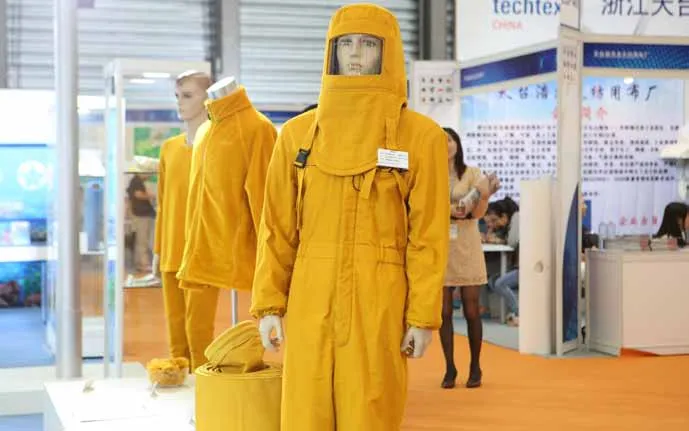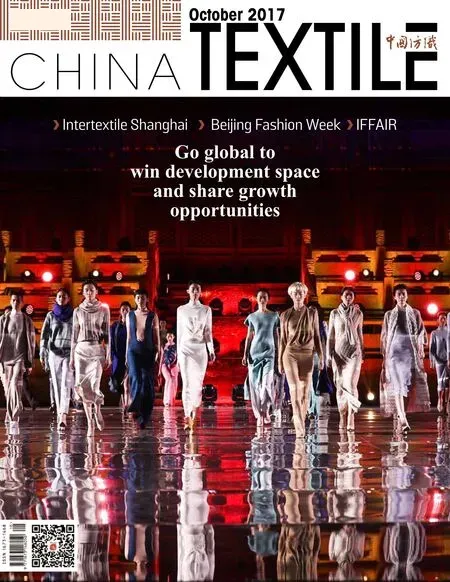Technology is the best footnote to change life
Original by Liang Ruili
Translated by Shen Da

In recent years, industrial textile industry undertakes the task for the growth of textile industry well,so it not only becomes one of important directions and main ways for the transformation and upgrade, and structural adjustment of textile industry, but also turns into the part of national strategic emerging industries and diversified high-tech industry across various fields.
Industrial textile industry has made important contributions to meeting the needs of the people’s life,protecting natural ecological environment, as well as improving comprehensive national strength and defense power and so on.
Rapid progress of technology &Highlighted effect of innovation
As an important field of textile technology innovation, industrial textile industry is an important direction for the structural adjustment and upgrading of the textile industry, and also the focus of the developed countries. The U.S. national manufacturing and innovation network program has established 11 innovative institutions, including two institutes of advanced composite manufacturing and revolutionary fiber and fabric manufacturing, both of which are related to industrial textiles.
And also, industrial textile industry has a vast potential for cross-industrial applications. Because of its good flexibility and high machinability, industrial textiles are widely used in medical treatment, environmental protection, safety protection, construction,transportation, aerospace, and many other fields. So many projects have won National Science and Technology Progress Award, and each subdivision of the industry has made a lot of innovation, forming a highly innovative situation.
For medical and health textiles, spunbond meltblown nonwovens for medical implementation with online and offline composite, have improved product performance; some medical products have entered application and clinical test stage; health care products with many materials and manufacturing process have the performance of environmental protection;low-cost fabrication technique of bacterial cellulose laid the foundation for the large-scale preparation and application of medical and functional nano-cellulose products.
For filtration and separation textiles, bag filter technology made the emission concentration of fine particles less than 10mg/m³, even reached the ultraclean emission standards, and also the service life of filter-bag were four years. The application ratio of bag filter technology increased to 25% from 10%, and the ratio of bag filter technology by waste incineration reached 100% in coal-fired power plant. Development project of filter materials has been selected to national strong foundation demonstration project and special funding for public service platforms. Water filtration textile materials and membrane assembly have been applied to a large number of sewage, wastewater and circulating water treatment systems.
For geotextiles and architectural fabric, composite membrane with two-side roughness improved the quality and speed of South-North Water Diversion Project; polypropylene geotextiles with high strength increase the constant chemical resistance of geotextiles in alkaline soils; the products of wide polyester filament spunbonded nonwovens improved the production efficiency and project quality of waterproof materials, and also broke the monopoly of foreign similar products; high-strength warp knitting polyester grille enhanced the efficiency of coal mine supporting system and safety of working plane; intelligent geotextiles with optical fiber sensor and monitoring system could provide integrated functional solutions.
For transport textiles, domestic nomex honeycomb core materials were applied in high speed trains ans large aircraft project; the products such as vehicle aramid pipe system, the airbag fabric and seat belts,achieved localization; high performance continuous fiber played an important role in automobile lightweight area; the technology to use recycled textile waste as damping materials has reached the international advanced level.
For protective and safety textiles, the performance of new firefighter uniform and emergency relief uniform has reached the international advanced level; the new generation of high performance military combat and training clothes were equipped with multiple protective properties; bioprotective fabric with composite structure could effectively prevent the virus vasion and keep constant moisture permeability; high performance rope achieved major technological breakthrough.
For textiles to enhance structure, semi-rigid panels of warp knitting materials decrease the weight of“Tiangong-1” satellite; glass and carbon composite materials reduced weight of wind power blade and prolong its service life; large diameter high-pressure storage tank has been used for national defense and emergency rescue; structural parts of carbon fiber composite material realized mass production; carbon fiber composite core wire was widely used in power transmission line.
For textiles in other areas, the promotion of vegetation restoration technology made initial success; the localization of drainage facilities has reduced production cost; biomass spunmelt nonwoven sand-control materials improved the treatment effect and avoided the secondary pollution; the equipment and technology of industrial numerical-controlled cutting and con-nection greatly increased the intelligent production of manufactured good
Continue to expand the application and substitution in the middle and high-end
It’s one of the themes of China’s economic adjustment to conform to the new trend of science and technology revolution and industrial transformation,and speed up the construction of modern industrial technology system. Scientific and technological innovation is an important engine for the development of industrial textiles, and the interdisciplinary and multifield convergence reflect industrial characteristics and innovative direction. We can see that the main field of high performance fiber is used for industrial textiles. It can be said that to improve the innovation of industrial textiles is the main task for China’s textile industry to create new competitive advantages and move forward mid-to-high end market. In recent years, the growth of fiber processing volume of global industrial textile has been about two times of that of all textile fibers, and according to related agencies of the United Nations,68% of the world’s textile fiber would be used for industrial textiles in 2050.
The “13th Five-Year” plan of textile industry first proposed the supporting projects of six key national development strategies, including the fields of strategic emerging industries, environmental protection, health and pension industry, emergency and public safety industry, “Belt and Road Initiative”, as well as military and civilian integration.
Undoubtedly, with the enhancement of environmental awareness, growth of emerging industries,industrial textiles has a large space for development.During the period of “13th Five-Year” plan, industrial textiles related to the six fields would be prior development directions.
It’s necessary to point out that with the progress of high-performance fiber and cross integration of various technologies, the technology level of the industry will rise to new height. With the popularization and application of industrial robots, IOT, big data, and the introduction of intelligent differentiated and personalized manufacturing modes, the performance level of textile industry will be improved, to develop more new application and market share.
For the future development goal of industrial textiles, the industry will maintain rapid and stable growth in “13th Five-Year” period. The industrial added value of above-scale enterprises will grow by an average of 9%, and total process of industrial fiber would increase by an average of more than 8%, which would account for 33% of the total fiber processing in the whole industry. The independent innovation capacity will be significantly improved, the ration of R&D investment of hundred backbone enterprises will increase to 2.5% in 2020 from 1.9% in 2015. The industrial structure will be further optimized, and the quality and efficiency will be improved, so as to cultivate a number of industrial textile enterprise groups with international influence.
For the future development goal of industrial textiles, the industry will maintain rapid and stable growth in “13th Five-Year” period. The industrial added value of above-scale enterprises will grow by an average of 9%, and total process of industrial fiber would increase by an average of more than 8%, which would account for 33% of the total fiber processing in the whole industry. The independent innovation capacity will be significantly improved, and the ration of R & D investment of hundred backbone enterprises will increase to 2.5% in 2020 from 1.9% in 2015. The industrial structure will be further optimized, and the quality and efficiency will be improved, so as to cultivate a number of industrial textile enterprise groups with international influence.
Industrial textiles industry has achieved a relatively stable growth. During the period, growth speed and transformation and upgrading will coexist, with two features: relatively high speed growth and mature of advanced technology. It is very important to create market, explore product attributes and terminal application, while the biggest challenges are to develop new products with customers and suppliers.
- China Textile的其它文章
- Intertextile Shanghai Apparel Fabrics: In-depth leading to create extraordinary
- A new decade to power glory of fashion knitting
- New materials,New momentum &New trends
- To explore the great courses of Beijing Fashion Industry 2017 Beijing Fashion Summit
- Snow Lotus performed first show to highlight cultural self-confidence of domestic brands
- “Belt and Road Initiative”promotes textile industry to create new international development advantages

